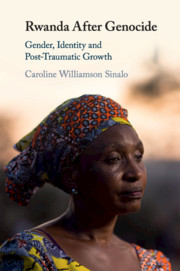Crossref Citations
This Book has been
cited by the following publications. This list is generated based on data provided by Crossref.
Kagoyire, Grace
Vysma, Marianne
and
Richters, Annemiek
2020.
Post-Conflict Hauntings.
p.
229.
Reilly, Elizabeth C.
2021.
Rwandan Women in Higher Education: Progress, Successes, and Challenges.
Frontiers in Education,
Vol. 6,
Issue. ,
Denov, Myriam
and
Shevell, Meaghan C
2021.
An arts-based approach with youth born of genocidal rape in Rwanda: The river of life as an autobiographical mapping tool.
Global Studies of Childhood,
Vol. 11,
Issue. 1,
p.
21.
Ungar, Michael
2021.
Resilience, Adaptive Peacebuilding and Transitional Justice.
p.
23.
Clark, Janine Natalya
and
Ungar, Michael
2021.
Resilience, Adaptive Peacebuilding and Transitional Justice.
Filippaki, Iro
2021.
The Poetics of Post-Traumatic Stress Disorder in Postmodern Literature.
p.
1.
Pells, Kirrily
Breed, Ananda
Uwihoreye, Chaste
Ndushabandi, Eric
Elliott, Matthew
and
Nzahabwanayo, Sylvestre
2022.
‘No-One Can Tell a Story Better than the One Who Lived It’: Reworking Constructions of Childhood and Trauma Through the Arts in Rwanda.
Culture, Medicine, and Psychiatry,
Vol. 46,
Issue. 3,
p.
632.
Goodwin, Morag
2022.
Evaluating the Success of Decentralisation in Facilitating the Inclusion of Rwanda’s Marginalised.
The European Journal of Development Research,
Vol. 34,
Issue. 5,
p.
2251.
Mwambari, David
and
Sibomana, Eric
2023.
Bodily Scars as Lived Memory in Post-Genocide Rwanda.
Body & Society,
Vol. 29,
Issue. 3,
p.
3.





